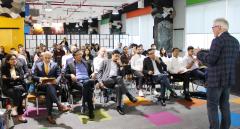UAE Tops Region In Adoption Of AI Solutions With Annual Growth Rate Of 33.5%

A report by the Dubai Technology Entrepreneurship Campus (Dtec), a wholly owned technology hub by Dubai Silicon Oasis Authority (DSOA), prepared in collaboration with ArabNet and startAD, an innovation and entrepreneurship platform anchored at New York University Abu Dhabi and powered by Tamkeen, revealed that the UAE ranks first in the region in terms of enterprise adoption of artificial intelligence (AI) applications with an annual growth rate of 33.5 percent.
Unveiled today at the Dtec Forum for Emerging Technology Companies at Dtec in Dubai Silicon Oasis, the Artificial Intelligence Adoption in Enterprise 2018 report compares levels of adoption of AI solutions among companies in the region and the world. The document also outlines strategies and mechanisms for implementing AI solutions at the institutional level, in addition to highlighting internal and external incentives that encourage companies to adopt these solutions.
The report quotes PwC’s 2017 forecasts that the contribution of AI to the global economy will increase to US$15.7 trillion by 2030, and that AI will contribute US$96 billion to (13.6 percent) to the UAE GDP by 2030.
While the report predicts that AI adoption will account for 45 percent of the world economy’s total gains by 2030, the UAE ranks first in the Arab world in terms of expected annual growth of AI contribution to the economy at 33.5 percent, followed by Saudi Arabia at 31.3 percent, the rest of the GCC region at 28.8 percent, and Egypt at 25.5 percent.
The report identifies multiple solutions AI can offer to companies, including operational applications, automation of robotic operations, reengineering of business processes, blockchain, big data analysis for marketing, customer care and data management, as well as using neural programming in talent search.
Speaking on the findings, Shahla Ahmed Abdul Razak, Deputy CEO DSOA, said: “The results of the report reiterate our country’s continued success in implementing the UAE Strategy for Artificial Intelligence. His Excellency Omar bin Sultan Al Olama, Minister of Artificial Intelligence, highlighted the strategy’s latest developments during the annual meetings of the UAE government in November 2018.”
She added: “As a major tech campus for startups in the heart of Dubai Silicon Oasis, Dtec is keen to collaborate with pioneering research institutions and incubators, such as startAD, to produce accurate data analysis reports and contribute to enabling technology entrepreneurship in Dubai and the wider UAE. To achieve these priorities, we can leverage the flexible regulatory frameworks and comprehensive strategies established by the UAE leadership to support entrepreneurs, emerging businesses, and SMEs, and attract local and foreign direct investments to fund innovative ideas in emerging sectors, including AI and smart city applications.”
For his part, Ramesh Jagannathan, Managing Director of startAD, said: “AI today plays a significant role in enhancing the productive capacity of countries and boosting the global GDP. To maximize its benefits, countries need to adopt AI policies across diverse sectors.”
He added: “The UAE continues to rank high in several regional and global indicators, including competitiveness, innovation, and ease of doing business, owing to its advanced AI policy that paves the way for the implementation of various smart government components. Leading by example, the corporations in the UAE are actively preparing to leverage the strengths of AI to build defensible value for the future”.
Omar Christidis, Arabnet CEO and Founder said, “AI is disrupting and redefining every industry – from the pricing of risk and interest rates in the finance industry, to predictive diagnosis in healthcare. Overall, AI can support process automation, personalization, and improving customer experience – and organizations that implement it effectively will be able to gain a competitive edge over their peers and deliver impact to their bottom line.”
The report lists three priority areas for enterprise adoption of AI solutions – AI for operation enhancement, AI for customer service enhancement, and AI for growth strategy support.
The document identifies the main factors that can have a positive or negative effect on the adoption of AI applications among companies and institutions, such as cost-benefit ratio, key trends that dominate the field, and budget availability.
Furthermore, the report outlines the concerns of entities regarding AI, primarily the risk of security breach, data leaks, privacy threats, job replacement, lack of knowledge required by suppliers, and the absence of regulatory frameworks in many countries. The report calls on companies specializing in AI to dispel these fears.
The document defines three types of AI. The first, specialized AI, comprises solutions such as virtual assistants – Siri and Alexa, digital customer service, purchase options outlook, self-driving vehicles, and automatic fraud monitoring. The second, advanced AI, enables machines to make decisions without training, learning, or pre-programming, and has not been achieved yet. Third, Super AI, is expected to surpass the intelligence of the human brain. At present, it also exists only in the minds of scientists and researchers.
In addition, the report reviews AI strategies for several institutions and companies in key sectors, such as telecommunications, financial services, automotive industry, and foodstuffs.
The methodology of the report involved qualitative research, analysis of the experience of entities active in the field of AI based on internal and external factors, and in-depth personal interviews with executives in key departments related to AI in those entities.
To view and download the Artificial Intelligence Adoption in Enterprise 2018 report, please copy and paste the following link to your preferred browser: https://www.dsoa.ae/static/media/uploads/ai_report.pdf.


